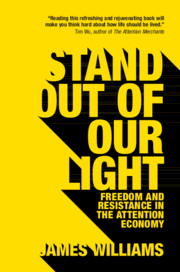Acknowledgments
Deepest thanks are owed to my wife, brothers, and parents for many years of love and encouragement. I wish to specifically acknowledge the influence of my father, Dr. Rodney Don Williams, a man to whose goodness and wisdom I daily aspire.
I am grateful to many friends, mentors, and colleagues who have helped me develop the ideas contained herein. For essential guidance during the course of my doctoral research, I thank Professor Luciano Floridi and the Digital Ethics Lab at the University of Oxford. I also thank Professor Julian Savulescu and the Oxford Uehiro Centre for Practical Ethics for ongoing feedback on my work. I am also deeply indebted to my friends at Balliol College for countless evenings of lively and well-lubricated debate, in particular Joshua Melville, Achas Burin, and Thomas Møller-Nielsen. I have also greatly benefited from my ongoing alliance with the global Time Well Spent community, in particular conversations with Tristan Harris, Joe Edelman, Max Stossel, and Anika Saigal.
I have also benefited from important conversations with many other formidable minds, among them Victoria Nash, William Dutton, Mariarosaria Taddeo, Tim Wu, Burkhard Schafer, Ralph Schroeder, Vili Lehdonvirta, Eric Meyer, Heather Ford, the DPhil seminars at the Oxford Internet Institute, Roger Crisp, Janet Radcliffe-Richards, Regina Rini, Jeff McMahan and the Oxford Moral Philosophy Seminars, the Oxford Applied Ethics Work in Progress Seminar, Anders Sandberg, Carissa Véliz, Fay Niker, Wael Ghonim, Benson Dastrup, Constantin Vică, and Emilian Mihailov.
This book would never have existed without the encouragement of Ernesto Oyarbide, who informed me about the Nine Dots Prize and nudged me to apply. I am grateful to all those who conceived and carried out the inaugural instance of this unique competition, including: Peter Kadas and the Kadas Prize Foundation; Jane Tinkler; Simon Goldhill and the Centre for Research in the Arts, Social, Sciences, and Humanities at the University of Cambridge; the Nine Dots Prize board members; and Caitlin Allen and Laura Curtis at Riot Communications.
Finally, I thank Chris Harrison and Sarah Payne at Cambridge University Press for their astute editorial guidance, as well as Crystal Lin for her support with elements of the research. I am also grateful to the Oxford Practical Ethics Blog, as well as Quillette Magazine, in whose pages I developed earlier versions of some ideas that appear in this book.

